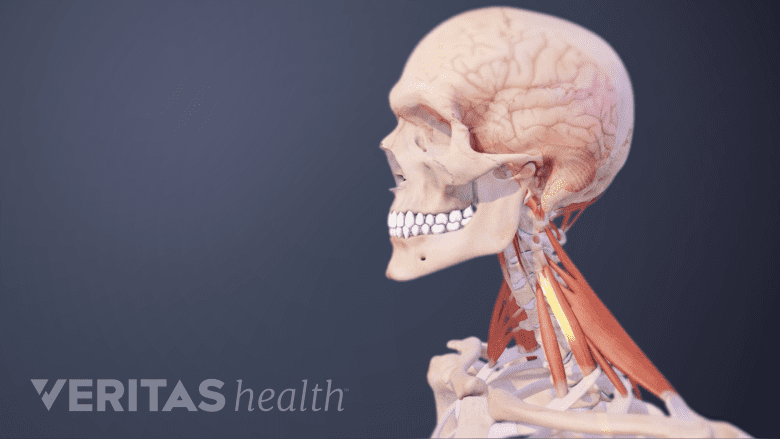A muscle spasm in the neck is a relatively common occurrence, which typically involves one or more muscles becoming painfully tight and/or fatigued. Neck spasms can interfere with everyday activities such as driving, concentrating, or carrying heavy items.
In This Article:
- Understanding Neck Spasms
- What Causes Neck Spasms?
- Neck Spasms Animation
The Course of Neck Spasms

Pain in the neck region can persist or pulsate and vary in intensity from mild to intense.
A neck spasm typically has a sudden onset but can also start gradually. Many people with neck spasms experience one or more of the following:
- Constant or throbbing neck pain, which can range from dull or mild to sharp or burning, and may also go down into the arm
- Twitching with repeated muscle contraction and relaxation occurring rapidly (also called fasciculation)
- Decreased range of motion in the neck and head, sometimes resulting in a stiff neck that cannot move in a specific direction, such as bending or turning to the side
- Cramping with the muscle strongly contracting and not relaxing, which may feel like a tightened knot and/or include sharp pain
- Headache that may start at the same time as the neck spasm, or perhaps as a result of an ongoing spasm and stress
The intensity of a neck spasm can vary greatly, ranging from a flutter in a small neck muscle that is easily ignored to a stronger contraction that pulls the neck and head in another direction. If a neck spasm involves severe pain or pulls the head to one direction, it may also include:
- Trouble with vision, such as from an inability to hold the head still or blurred vision
- Dizziness or balance issues
- Fatigue from numerous head movements, intense pain, and/or elevated stress levels
See Understanding Neck Pain and Dizziness
Neck spasms typically resolve within a few minutes or hours, but it is possible for them to last much longer and become chronic.
Development of Neck Spasms

When a muscle tries to protect itself from strain, inflammation, or spinal instability, neck spasms may occur.
The exact mechanisms involved in the development of neck spasms are not well understood.
One or more of the following factors may cause a neck muscle spasm:
- A muscle tries to protect itself, such as from strain, overuse, fatigue, inflammation, and/or spinal instability
- A muscle receives altered electrical signals due to an abnormality in the nerve pathways or the brain
See Neck Strain: Causes and Remedies
For many years it was commonly thought that an electrolyte imbalance in a muscle, such as from dehydration, could contribute to muscle spasms or cramps, but that theory has not been supported by evidence in recent years.1Giuriato G, Pedrinolla A, Schena, F, Venturelli M. Muscle cramps: a comparison of the two-leading hypothesis. J Electromyogr Kinesiol. 2018. 41: 89-95. doi: 10.1016/j.jelekin.2018.05.006
Getting a Diagnosis for Neck Spasms
For neck spasms that linger longer or keep returning, a diagnosis for the underlying cause is typically sought. A physical medicine and rehabilitation doctor (physiatrist), physical therapist, or chiropractor can accurately diagnose the cause of neck spasms in most instances.
- 1 Giuriato G, Pedrinolla A, Schena, F, Venturelli M. Muscle cramps: a comparison of the two-leading hypothesis. J Electromyogr Kinesiol. 2018. 41: 89-95. doi: 10.1016/j.jelekin.2018.05.006

